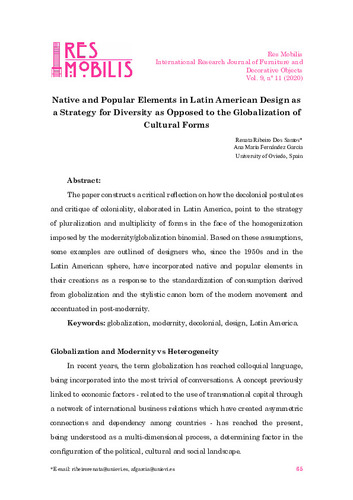Native and Popular Elements in Latin American Design as a Strategy for Diversity as Opposed to the Globalization of Cultural Forms
Autor(es) y otros:
Palabra(s) clave:
globalization
modernity
design
decolonial
Fecha de publicación:
Editorial:
© Ediuno. Ediciones de la Universidad de Oviedo
Versión del editor:
Citación:
Descripción física:
Resumen:
From decolonial postulates, an analysis is given of how indigenous elements, as well as those proceeding from popular culture, were gradually introduced into Latin American design and its theory, making a case for and defending the diversity of form and the multiplicity of ways of comprehending space as a strategy against homogenisation imposed by the process of globalization. This text outlines some examples of reactions from creators to the standardisation of consumption arising from globalisation and the homogenisation of style born from the modern movement and accentuated in the post-modern movement.
From decolonial postulates, an analysis is given of how indigenous elements, as well as those proceeding from popular culture, were gradually introduced into Latin American design and its theory, making a case for and defending the diversity of form and the multiplicity of ways of comprehending space as a strategy against homogenisation imposed by the process of globalization. This text outlines some examples of reactions from creators to the standardisation of consumption arising from globalisation and the homogenisation of style born from the modern movement and accentuated in the post-modern movement.
ISSN:
Colecciones
- Artículos [34686]
- Historia del Arte y Musicología [441]
Ficheros en el ítem





